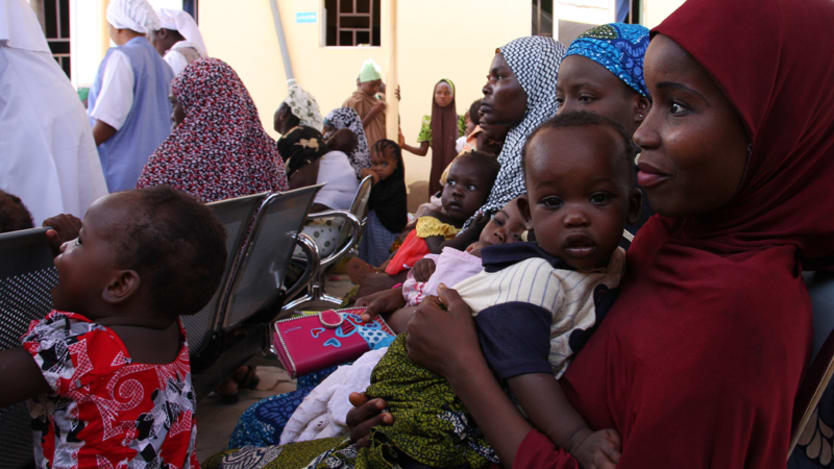
If you ask anyone to describe home in one word they frequently will respond with either “comfortable” or “safe.” No matter where you live in the world, home is the place people long to be.
For the nearly 60 million internally displaced persons, refugees and asylum-seekers worldwide, home is nowhere in sight. Humanitarian emergencies and conflicts have driven them away from all they know as comfortable and safe. Those most impacted are also the most vulnerable — women, adolescents and children.
Worldwide, women and children are up to 14 times more likely than men to die in a sudden-onset disaster. For those who survive, the necessities of life continue. Women still have babies and need prenatal care. Children still need to be vaccinated, and adolescents still need access to education and health care services, including contraception.
But, life is different. There’s no home, and there are few, if any, health services available.
A challenge to women’s and girls’ health
Read related stories:
► Fulfilling the miracle of Bangladesh: New results on how to delay child marriage
► Why health-related workplace programs are like jumbo jets
► The big picture: Empowering, not just reaching, all women and girls
► Zika during pregnancy: Why we need social norms changes for girls
It is estimated that there are 26 million women and girls of reproductive age living in emergency situations, all of whom need health services. Data from the Organization for Economic Cooperation and Development on 50 fragile states show that the estimated lifetime risk of maternal mortality in these countries is 1 in 54, compared to 1 in 4,000 in developed countries. More than 60 percent of maternal deaths, 53 percent of under-5 deaths and 45 percent of newborn deaths take place in fragile settings.
In crises settings women and girls often lack access to basic health services, such as family planning and prenatal care. Even when these services are available, women are often turned away because of a lack of legal documentation of migration status, ethnicity or marital status, to name a few discriminations.
Furthermore, high levels of sexual or gender-based violence in emergencies — including rape, female genital mutilation, forced pregnancies and child marriages — further subject women and girls to ill health, deprivation and neglect.
What we need is to ensure the protection of health and human rights of women, children and adolescents, in all crises settings, everywhere. While women’s and children’s survival improved through the Millennium Development Goals and the U.N. Secretary-General’s 2010 global strategy for Every Woman Every Child, more than 80 percent of the countries that did not achieve the goals endured a recent conflict, natural disaster or both.
Unfortunately, both of these efforts fell short for women’s and children’s health in humanitarian emergencies.
We now know the gaps — and how to address them
Last year, with the adoption of the Sustainable Development Goals, countries committed to leave no one behind. Embedded and aligned with the SDGs, the new Global Strategy for Women’s, Children’s and Adolescents’ Health is targeting more than survival. It’s calling for transformative actions that provide women, children and adolescents with what they need to thrive and transform the societies we live in. In order to thrive, women and girls of reproductive age experiencing humanitarian emergencies need sexual and reproductive health services.
The first step is ensuring all countries and humanitarian partners put the Minimum Initial Service Package for reproductive health in place during emergencies. This package provides clinical care for survivors of rape, makes condoms available to prevent HIV transmission, and ensures availability of skilled birth attendants to prevent maternal and newborn mortality.
To provide these services, the Global Strategy also calls for more health workers and better data collection on women’s, children’s and adolescents’ health needs in emergencies. These same services are building blocks for stronger health systems in the long term. On average, the length of displacement owing to war and persecution is 17 years. We need to make sure all children and adolescents can reach their full potential during that time.
Last, one of the greatest solutions is more flexible financing from the start of emergencies. If low- and middle-income countries cannot access funds during emergencies, how can we expect them to fund a package of health services that includes nutrition, water, sanitation and hygiene?
If we are to meet the SDGs, we need to tailor our attention to sustainable, inclusive development for women, children and adolescents in humanitarian emergencies. This is our opportunity to ensure no one is left behind.
Everyone deserves to survive, thrive and transform the world. The upcoming World Humanitarian Summit and Women Deliver Conference look to address the challenges facing our humanity, and so it is a critical opportunity for governments to reaffirm this commitment. The Agenda for Humanity must be made a reality for every woman, every child, every adolescent, everywhere.
Interested in more stories about women's and girl’s health? Make sure to follow us this May for live Devex coverage of the fourth Women Deliver conference in Copenhagen, Denmark. Join the conversation by tagging @devex and using #WD2016.









